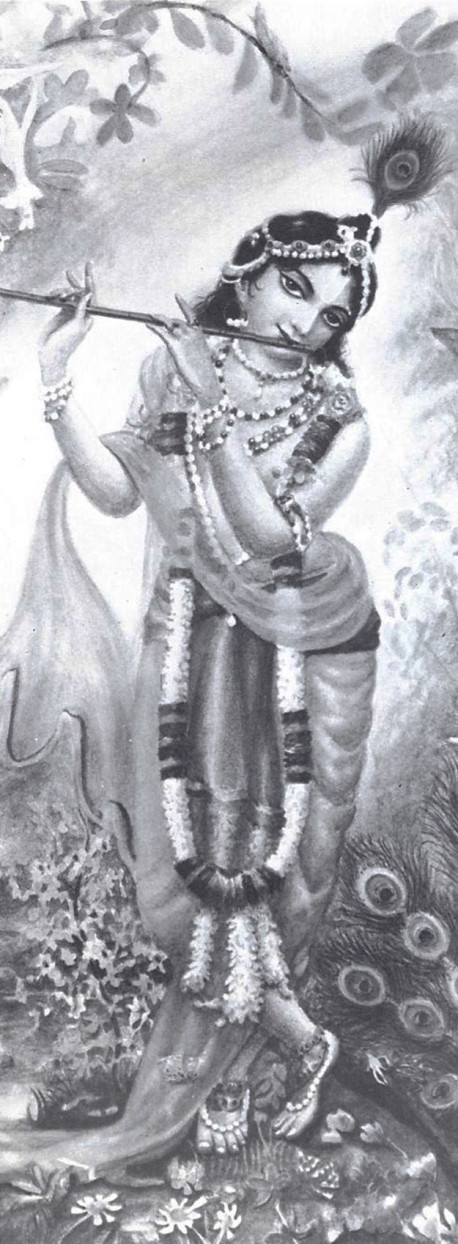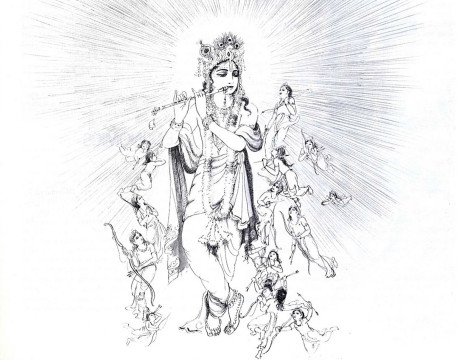Food, Shelter, Sex, and Snoring
His Divine Grace A.C. Bhaktivedanta Swami Prabhupada
dharmasya hy apavargyasya
nartho ‘rthayopakalpate
narthasya dharmaikantasya
kamo labhaya hi smrtah
 “All occupational engagements (dharma) are certainly meant for ultimate liberation. They should never be performed for material gain. Furthermore, one who is engaged in the ultimate occupational service (dharma) should never use material gain to cultivate sense gratification. (Srimad-Bhagavatam, 1.2.9)
“All occupational engagements (dharma) are certainly meant for ultimate liberation. They should never be performed for material gain. Furthermore, one who is engaged in the ultimate occupational service (dharma) should never use material gain to cultivate sense gratification. (Srimad-Bhagavatam, 1.2.9)
In spite of working so hard, there is frustration. No one is satisfied, I am not satisfied, nor is the person for whom I work so hard satisfied. Pa, pha, ba, bha, ma. Bha means always fearful. We are always wondering what danger is coming next. Ma means death, mrtyu. This is material life: You work very hard, so hard that foam will come from your mouth, and still you feel frustration and are always fearful. In this way you live, and then one day comes and you die.
This is called pa-varga. Dharmasya hy apavargyasya. Pavarga: a means “just the opposite.” By taking to dharma, or religious principles, one can nullify the principles of material life. No one wants to work very hard, but everyone has to because in the material world a person cannot even get food without working hard. A small ant only needs one grain of food a day, yet he still has to work, going hither and thither trying to find his food. Similarly, the elephant needs a hundred kilos of food at a time, and he also has to work. Material life is like that; no one can live idly. Nahi suptasya simhasya pravisyanti mukhe mrgah. (Hitopadesa) The lion is a very powerful animal, and he is called the king of the forest, or the king of the animals. When he sleeps, no animal will come near him. Although a king, no animal says, “Please, Mr. Lion, please open your mouth and I shall enter.” Mr. Lion has to work very hard, and although he is very powerful, he doesn’t always get food. Similarly, when a tiger is in the jungle, every animal knows it and avoids the tiger, so they don’t always get food either.
Mohammedans are especially proud to become like a sher. Sher means lion or tiger, and it is said that if one can become like a sher, he will be considered very powerful. Even in England the British lion symbolizes power, but at the end of the Second World War, the British lion was badly bandaged. Now in Trafalgar Square there are only large stone lions. In this world these symbols of power are all false. There was Napoleon, the French lion, and there was the British lion, and there was the Roman lion. In this way and that the people are simply wasting their time. Srama eva hi kevalam. (Bhag. 1.2.8) They are all rascals because they do not know the value of life. Nor do they know what is to be done. Even religion is taken for some material gain. However, in Srimad-Bhagavatam it is said that religion is not for material gain, for religion is meant for apavargyasya. One has to get liberated from these four principles of material life: hard labor, which causes one to foam at the mouth, frustration, fear and death.
Matchboxes
Such is material life, but people are so foolish that they think that these principles represent advancement. Is this advancement? By working very hard a person may get a very nice large house and a car, and in this way one may think that his life is successful, but after fifty years, the house is only good for demolition. One matchbox goes up, and another comes down. This is constantly going on. Punah punas carvita-carvananam. “All right, you require a house, and now you have a nice one. Why are you demolishing it again?” “It’s a new fashion,” is the reply. This, then, is contemporary civilization. Houses are constructed with hard labor, and again they are demolished with hard labor, and once again they are constructed with more hard labor. And people have become such rascals that they do not think, “What am I gaining by this hard labor?” Real religion shows one how to get out of this cycle of hard labor.
In Srimad-Bhagavatam it is said: nayam deho deha-bhajam nrloke kastan kaman arhate vid-bhujam ye. The word kaman indicates the fact that we require some necessities of life, for in this material body we require to eat, sleep, have sex and defend ourselves. So we do this, for there is no prohibition; we eat, sleep, have sex and defend, and do them all as easily as possible. But we do not have to labor very hard for these and make it difficult. We have to eat, and that’s all right; we can eat. The birds and bees are also eating without hard labor, and why have we manufactured such a nonsensical civilization that we have to work so hard simply for a piece of bread? And why must we work in order to be able to sleep peacefully? There is so much hard labor for these things that now people have become disgusted and have given them up. Thus the hippies say, “We don’t want to work.” But after a while, when they find it very difficult to live without work, they again come to work. Punah punas carvita-carvananam. People work, then they leave work, saying, “We shall not work,” and again they take up work and work very hard, then again they give it up. This is called punah punas carvita-carvananam: chewing the chewed. We give up work, but we return to work because there is no other way to live. This is the problem. Na te viduh svartha-gatim hi visnum. Foolish people do not know what the aim of life is. Everyone says that he is interested in his own welfare, or self-interest, but no one knows what real self-interest is. Therefore people are mistaken and are simply frustrated by working hard. They work so hard that foam comes from their mouths. All this is going on.
Dharma indicates the end of such a civilization of rascals. That is real dharma. Therefore Krsna says in Bhagavad-gita:
sarva-dharman parityajya
mam ekam saranam vraja
aham tvam sarva-papebhyo
moksayisyami ma sucah
“Abandon all varieties of religion and just surrender unto Me. I shall deliver you from all sinful reaction. Do not fear.” (Bg. 18.66)
“Just come to this side,” Krsna says. “Simply surrender, you rascal, and just give up all these so-called religions. They are not giving you any relief, and you are simply wasting your time.” Srama eva hi kevalam. By so-called religions, no one really develops an understanding of what God actually is. People are going to temples and churches and mosques, but they do not know what God really is. If we ask anyone, any religious man, “so you know what God is?” he will say, “Oh, He is sublime … He is this, and He is that …” All we get is a vague idea. However, one who is devoted to Krsna knows definitely that here is God—Krsna. Here is His eternal consort—Radharani. Here He is, enjoying in this way. Thus the Vedas give definite information about God and His activities.
cintamani-prakara-sadmasu kalpa-vrksa-
laksavrtesu surabhir abbipalayantam
laksmi-sahasra-sata-sambhrama-sevyamanam
govindam adi-purusam tam aham bhajami
“I worship Govinda, the primeval Lord, the first progenitor, who is tending the cows and fulfilling all desires in abodes built with spiritual gems, surrounded by millions of wish-fulfilling trees, always served with great reverence and affection by hundreds and thousands of Laksmis, goddesses of fortune.” (Bs. 5.29)
Krsna’s Abode
In this way we know that God has His own abode, which is made of touchstone, and we learn of the houses there and the wish-fulfilling trees (kalpa-vrksa). Not only is there one, but there are millions of such wish-fulfilling trees. Surabhir abhipalayantam: Krsna is engaged in tending surabhi cows. One can take as much milk as many times as he likes from a surabhi cow. Laksmi-sahasra-sata-sambhrama-sevyamanam. Laksmi is the goddess of fortune. We all want the favor of the goddess of fortune, but in the spiritual sky the Lord is served by millions of goddesses of fortune. Nor is it that God is asking their favor. We may ask a favor of the goddess of fortune, “Dear Mother, goddess of fortune, please give me some money.” Even though Krsna does not care, the goddesses are rendering service to Him with great veneration (sambhrama).
In this way the Vedas give information: “Here is God.” Govindam adi-purusam tam aham bhajami. “I worship Govinda, the primeval Lord.” This is real religion. Real religion means knowing God, knowing where God is and what He is doing. Thus we must receive all information from Vedic literature.
venum kvanantam aravinda-dalayataksam
barhavatamsam asitambuda-sundarangam
kandarpa-koti-kamaniya-visesa-sobham
govindam adi-purusam tam aham bhajami
“I worship Govinda, the primeval Lord, who is adept at playing on His flute, who has blossoming eyes like lotus petals, whose head is decked with peacock feathers, whose body is the figure of beauty tinged with the hue of blue clouds, and whose unique loveliness charms millions of Cupids.” (Bs. 5.30)
In this way we learn that God is engaged in playing His flute, and that His eyes look just like the petals of a lotus flower, and that He is so beautiful that He can defeat millions upon millions of Cupids. Thus He is called Madana-mohana. He is so attractive that even Madana (Cupid) is attracted to Him. Cupid attracts everyone, but He attracts Cupid. That is the meaning of Madana-mohana. And Radharani is Madana-mohana-mohini, for She attracts Madana-mohana. Here, then, is God—what do people know of Him?
Day And Night

Dharmasya hy apavargyasya nartho ‘rthaya. Generally people go to church, mosque and temple just to beg bread. “Oh, God, give us our daily bread.” Thus everyone goes, Hindus, Moslems, Christians, etc.—they all go to church or mosque or temple just to beg some material profit. Srimad-Bhagavatam says: dharmasya hy apavargyasya nartho ‘rthayopakalpate. That which is not meant for any material gain is real religion. Na arthaya. Artha means material gains, and paramartha means spiritual gains. Narthaya. “If I don’t get money,” everyone says, “how shall I live?” Of course we should get money, but that money should not be our whole aim and objective of life. Yavad artha-prayojanam. We can receive as much money as we require to maintain the body; that is not forbidden. But why do we labor so hard all day and night? In New York, London or any other modern city we find so many buses running at all hours. It is a nice arrangement, but often there are no passengers. Nonetheless these buses are made to work hard, to come here and go there quickly. Diva carthehaya rajan kutumbabharena va. This materialistic way of life means sleeping at night and snoring (zzzzz), and getting a woman and having sex. And that is all. Nidraya hriyate naktam vyavayena ca va vayah. There is either sex or snoring. And diva carthehaya rajan: in the daytime one simply has to wonder, “Where is money? Where is money? Where is money?” Then we get money and run to the store. Kutumbabharena va. Then we purchase something, and when we purchase something, our money goes. Then night comes, and again it is time for sex. If we ask a person who is thus engaged where his time is for Krsna consciousness, he says, “No time, sir.” This is civilization, a civilization of rascals. It is simply a waste of time: srama eva hi kevalam.
Although the human life is so valuable that one can get out of the pavarga of hard labor, foaming at the mouth, fear and death, no one cares about it. This is because extrication from such life is so difficult for most people. They think, “Oh, let us die. What is that? After death there is nothing.” So-called great philosophers and professors adhere to such a view, and all this is going on in the name of civilization and advancement of education. The politicians and religious leaders have no knowledge, and yet they are leading the public. They are all rascals and fools. A rascal is one who has no knowledge. One who is in Krsna consciousness can challenge all such rascals, be they so-called great philosophers, professors or whatever. What knowledge do they have: Their knowledge is simply animal knowledge, for animals work very hard simply to gratify their senses. Real civilization, however, means stopping such animalistic life
Of course, everyone wants to stop working hard. We all have the tendency to went to get away. As soon as materialists get a free moment, they immediately want to leave the city and go to some nice peaceful bungalow in the country. Everyone wants this, but to get such so-called peace one has to work very hard. Why don’t we therefore make life simple: We can live anywhere and live by nature’s way. There are trees and meadows, and we can live there, keep some cows and get milk, produce some grains and fruits and be happy. In this way our whole economic question can be solved. Why do we have to bother so much with factories and great workshops and large ships and vans going here and there. These are all simply complications. Everything is trying to move so fast. Karma-bandha: that is the entanglement of karma. Sat-sanga chadi’ kainu asate vilasa. The word sat-sanga indicates that one has given up the association of the Supreme and has taken to the association of material life, thereby becoming entangled in karma. Thus the process of destruction and construction begins again. But we no sooner get something constructed than it is damaged or destroyed, and we get the opportunity to reconstruct again, and again it will be finished. The real business of human life is earning how to end this hard struggle for existence
Economics

Our real business is to listen to Krsna, and Krsna says: sarva-dharman parityajya mam ekam saranam vraja. Abandon all varieties of religion and just surrender unto Me.” In this way all our problems will be solved. Dharmasya hy apavargyasya nartho ‘rthaya. Dharmasya does not mean material gain, but if there is need of material gain, there is accommodation. Narthasya dharmaikantasya. Dharma-eka: those who are actually religious do not look on money as sense gratification. The more money materialists get, the more they spend for sense gratification. One may live humbly with a small income of $500, but if that is not sufficient, he struggles harder to get $1,000, and he immediately takes another apartment which is larger. Then he is not satisfied with that apartment, and eventually he has to work harder to make $2,000, and with that he gets another apartment which is even better, but soon that is not sufficient either. A car is needed, and as soon as one car is bought, another is needed. In this way the more money we get, the more we increase our program for sense gratification. Of course money is required, but we should not increase our artificial wants. We should always keep in aim our view that the purpose in life is to get out of the clutches of material nature. The modern theory of economics increases artificial desires. The bank will say, “Take money from me and purchase a car.” And the car manufacturer will show us a new car every year. In this way we become entangled, and the more we earn, the more debts we pay. All this is going on.
We increase our wants, and we become embarrassed when we have to get the money. We struggle hard to get the money and thus increase our sense gratification. Narthasya dharmaikantasya. But for those who are actually religious, more money or income (artha) does not increase sense gratification. The religious man thinks, “Oh, I have more money. Now let me spend it for Krsna.” That is dharma. Here is a movement to promote Krsna consciousness, and those who have money can help push this movement forward. Unfortunately, the wealthy spend their money just to purchase a dozen motor cars. Narthasya dharmaikantasya kamo labhaya hi smrtah. Kama means sense gratification. That is how most people waste their money and their lives—increasing sense gratification.
We have already discussed that pure devotional service of the Lord is automatically followed by perfect knowledge and detachment from material existence. Yet there are those who consider that all occupational engagements, including those of religion, are meant for material gain. Such people come to the temple or church and give some contribution, but their aim is that by contributing one dollar they will get a hundred dollars in return. In other words, church is an easy way of earning money. The majority of people do not come to understand what Krsna, God, actually is. Whenever they put money in the collection box, they think, “This will increase.” Of course it will increase because Krsna supplies all things, but that should not be the motive of one’s worship. We should not make business with Krsna. We should try to serve Krsna and sacrifice everything. Then our life will be successful.
If we want to make business, Krsna will also give us business. Ye yatha mam. If we want money from Krsna, Krsna will give us money. But what will we do with that money? Because we do not know how to spend it, we will simply engage it for sense gratification. In this way we become implicated again. Therefore Krsna renders His devotee a special favor. When one is trying to become Krsna conscious but at the same time wants to have some material enjoyment, Krsna takes away whatever material enjoyment is there. Krsna knows that this is the best course to take with a man who is sincere but who, due to his bad habits, wants some material enjoyment. Krsna takes all material enjoyment away and makes the man completely free. When one is thus freed and helpless, he takes shelter of Krsna. That is Krsna’s special favor.
Nectar For The Swanlike Men
The swan is a beautiful creature, gliding gracefully with poised and delicate motions across the clear waters of a lotus-filled pond. As if to enhance the swan’s beauty, nature has given her a wonderful ability, for from a mixture of milk and water, the swan can skillfully drink only the milk, without taking any water. Similarly, the most elevated transcendentalists are called paramahamsas, or swanlike men, because of their ability to imbibe only the most sweet and essential nectar of spiritual knowledge from the midst of the water of the material world. Now, for swanlike men, there is an unlimited reservoir of spiritual pleasure in the Vedic translations, commentaries and summary studies of His Divine Grace A.C. Bhaktivedanta Swami Prabhupada. Clear, fresh and nectarean, these books of spiritual knowledge contain the true essence of life for which all swanlike men are searching.


Leave a Reply